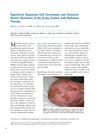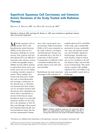 12 citations,
March 2011 in “Journal of pathology”
12 citations,
March 2011 in “Journal of pathology” Oncogenic K-ras causes rapid cancerous changes in the mouth's lining.
 10 citations,
January 2013 in “Journal of skin cancer”
10 citations,
January 2013 in “Journal of skin cancer” PKC ε increases hair follicle stem cell turnover and may raise skin cancer risk.
 8 citations,
July 2022 in “International Journal of Molecular Sciences”
8 citations,
July 2022 in “International Journal of Molecular Sciences” Skin cells release substances important for healing and fighting infection, and understanding these could improve skin disorder treatments.
 2 citations,
January 2018 in “Elsevier eBooks”
2 citations,
January 2018 in “Elsevier eBooks” Targeted therapies for lung cancer are effective but require careful management of side effects to benefit patients.

Deleting Smad4 and PTEN genes in mice causes rapid, invasive stomach cancer.
 November 2018 in “Atlas of genetics and cytogenetics in oncology and haematology”
November 2018 in “Atlas of genetics and cytogenetics in oncology and haematology” WNT10B is linked to cancer development and affects survival and disease progression in various cancers.
 June 2017 in “Journal of evolution of medical and dental sciences”
June 2017 in “Journal of evolution of medical and dental sciences” About 22% of cancer patients had skin-related side effects from chemotherapy, but these were usually not severe enough to halt treatment.
 32 citations,
January 2012 in “International Journal of Dermatology”
32 citations,
January 2012 in “International Journal of Dermatology” Skin side effects from EGFR inhibitor cancer treatment can be managed effectively, often without stopping the medication.
22 citations,
August 2020 in “Cells” TGM3 is important for skin and hair structure and may help diagnose cancer.
 18 citations,
January 2017 in “Postępy Dermatologii i Alergologii”
18 citations,
January 2017 in “Postępy Dermatologii i Alergologii” EGFR inhibitors can cause various skin issues during cancer treatment, and managing these is important for patient care.
 14 citations,
February 2023 in “Frontiers in immunology”
14 citations,
February 2023 in “Frontiers in immunology” Immune checkpoint inhibitors can cause skin issues but are linked to better cancer outcomes.
 7 citations,
August 2017 in “PloS one”
7 citations,
August 2017 in “PloS one” Key genes linked to hair growth and cancer were identified in hairless mice.
 5 citations,
May 2006 in “Dermatologic Surgery”
5 citations,
May 2006 in “Dermatologic Surgery” Radiation therapy successfully treated an elderly man's skin cancer and pre-cancerous scalp lesions.
 1 citations,
January 2023 in “Cutis”
1 citations,
January 2023 in “Cutis” You might not need to stop cancer treatment if you get a rare skin reaction from EGFR inhibitors, as skin treatments can help manage it.
 1 citations,
April 2017 in “Journal of Investigative Dermatology”
1 citations,
April 2017 in “Journal of Investigative Dermatology” A new one-step test can quickly identify skin cancer during surgery.
 January 2025 in “Cell Communication and Signaling”
January 2025 in “Cell Communication and Signaling” CXXC5 can both suppress and promote cancer, making it a complex target for treatment.
 May 2006 in “Dermatologic Surgery”
May 2006 in “Dermatologic Surgery” Radiation therapy successfully treated an elderly man's skin cancer and pre-cancerous scalp lesions.
 112 citations,
January 2014 in “Molecular and cellular therapies”
112 citations,
January 2014 in “Molecular and cellular therapies” Blocking the Wnt pathway could lead to new treatments for cancer and tissue repair but requires careful development to avoid side effects.
 49 citations,
August 2004 in “The FASEB Journal”
49 citations,
August 2004 in “The FASEB Journal” Mice with human skin protein K8 had more skin problems and cancer.
 34 citations,
July 2009 in “Journal of Cell Science”
34 citations,
July 2009 in “Journal of Cell Science” ΔNp63α helps control a protein that stops cancer cells from spreading.
 29 citations,
October 2016 in “Cell death and differentiation”
29 citations,
October 2016 in “Cell death and differentiation” ΔNp63α stops TAp73β from working in skin cancer by blocking its access to specific genes, not by directly interacting with it.
 26 citations,
October 2018 in “Clinical & Translational Oncology”
26 citations,
October 2018 in “Clinical & Translational Oncology” Spanish experts provided guidelines for treating skin side effects in cancer patients on new therapies, stressing early action and teamwork.
24 citations,
August 2020 in “JAMA dermatology” Persistent radiation-induced hair loss is dose-dependent, and treatments like topical minoxidil can be effective.
 15 citations,
July 2013 in “Cell Reports”
15 citations,
July 2013 in “Cell Reports” Indian Hedgehog helps control skin cell growth and protects against aggressive skin cancer.
 11 citations,
March 2014 in “Journal of Investigative Dermatology”
11 citations,
March 2014 in “Journal of Investigative Dermatology” Genetic mutation and carcinogen treatment are both needed for skin cancer to develop in these specific mice.
 9 citations,
March 2013 in “Expert opinion on biological therapy”
9 citations,
March 2013 in “Expert opinion on biological therapy” Epidermal stem cells have potential for personalized regenerative medicine but need careful handling to avoid cancer.
 8 citations,
March 2014 in “American Journal of Pathology”
8 citations,
March 2014 in “American Journal of Pathology” Damaged hair follicles make mice more prone to skin inflammation and skin cancer after UV exposure.
 3 citations,
December 2022 in “Cells”
3 citations,
December 2022 in “Cells” Cannabinoids like CBD and THC may help treat non-cancer skin diseases, but more research is needed.
 1 citations,
July 2015 in “British Journal of Dermatology”
1 citations,
July 2015 in “British Journal of Dermatology” Imiquimod improved skin pigmentation in most patients with xeroderma pigmentosum and may prevent further skin cancer, but some treatments can have side effects.
 1 citations,
October 1996 in “Journal of Cutaneous Medicine and Surgery”
1 citations,
October 1996 in “Journal of Cutaneous Medicine and Surgery” Gene therapy shows promise for treating skin disorders and cancer, but faces technical challenges.




























